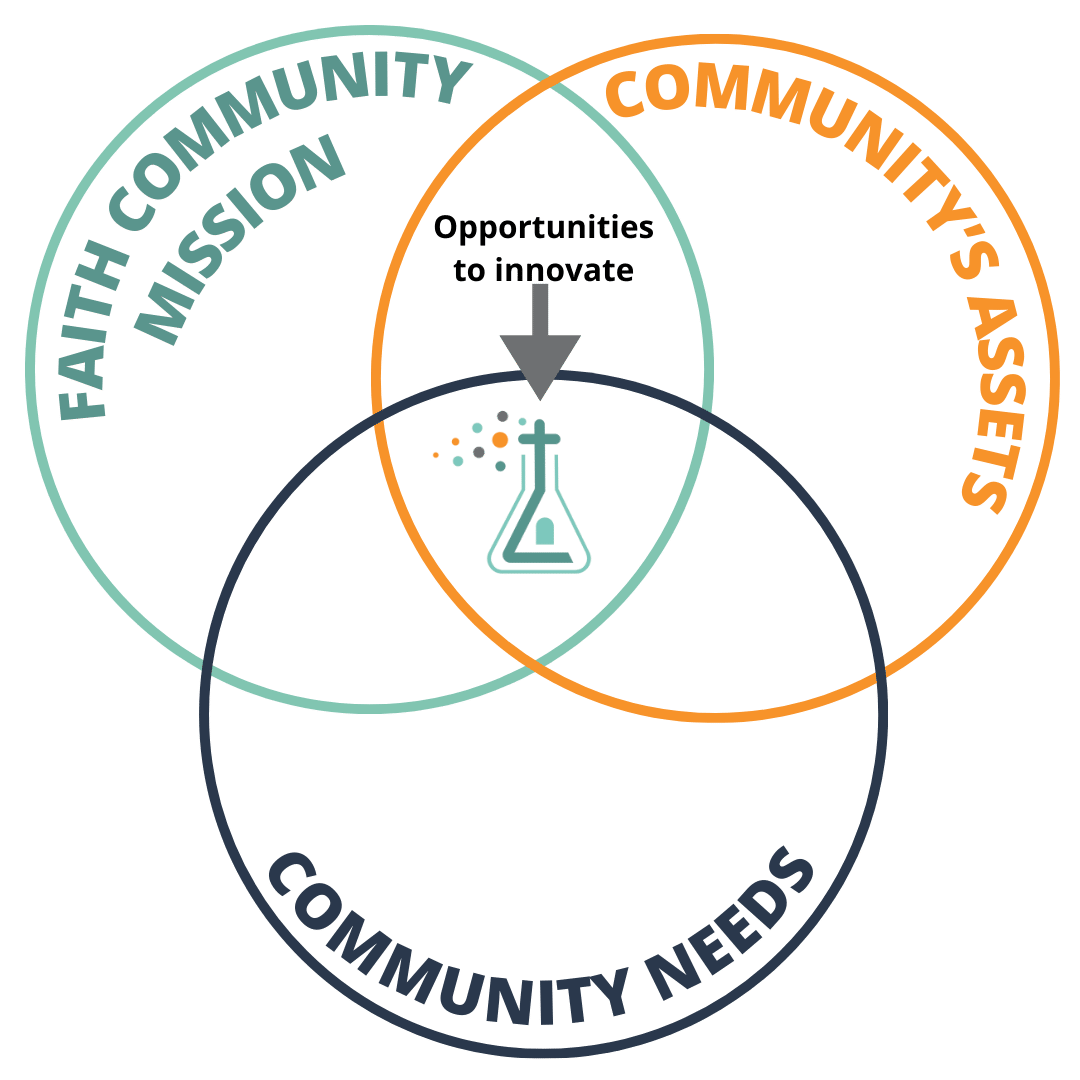Innovation Lab
Transforming how faith communities develop ministry – for leaders, churches, denominations, & institutions.
The Innovation Lab exists to equip YOU to innovate faithfully.
We believe innovation isn’t synonymous with “new” or “cutting edge.” Instead, it emerges at the intersection of a faith community’s mission, a community’s assets, and a community’s needs, and must be led by the Holy Spirit.

Innovation Lab Products and Resources

Lab Resources
No matter where you are in the process of reimagining ministry, we offer resources and tools that will catalyze innovation in your context. Our resources are designed with busy leaders in mind and can fit within the demands of any ministry setting’s schedule and budget.
Ministry Transformation Lab
Faithful innovation requires more than just a great idea. You need a structured process, a guide, and a community of support on the journey with you. Our Ministry Transformation Lab is an 18-month, guided experience to develop, test, and launch an innovative ministry.

Innovative Solutions
Successful innovation is never a solo endeavor. Whether you serve a denomination, church, or other organization, we can help you break out of the traditional molds of ministry. We offer customized training, workshops, coaching, and resources that can meet your unique needs.
The Theological Innovation Process
Innovation is an invitation to fail. Our five-phase Theological Innovation Process surrounds you with the support and structure you need to fail forward. We bring design thinking into conversation with theological reflection and asset-based community development.

5-PHASE PROCESS
Phase 1 – Describing
Guiding questions: What’s going on in the lives of people in my community? What joys and challenges are people facing? Where is God at work?
Innovators learn about and grow in their understanding of their context — meaning both the faith community and the wider, geographic community beyond the faith community’s walls. Innovators learn about the impacts of their faith community’s culture on their ability to innovate and cultivate empathy for the people in their wider community.
Phase 2 – Interpreting
Guiding questions: Why is the dominant need or challenge we are observing in our community happening? What is the root cause? What community assets are present?
Innovation Teams explore why their context is the way it is and identify community assets, while attempting to see beyond their own assumptions. The phase ends when teams identify one primary purpose statement that will guide their innovation moving forward.
Phase 3 – Norming (Theological Reflection)
Guiding question: What should be happening in our community according to God’s desires for people and creation?
Determining what should be happening according to God’s desires unearths the innovative potential of a ministry. Innovation teams follow the Holy Spirit’s leading. They discern what their unique theology has to say about what’s happening in their community and how they’re called to address it.
Phase 4 – Ideating & Prototyping
Guiding questions: What innovation could we create that would address the challenge or need identified in our purpose statement? How can we draw on the community’s assets as we innovate?
Teams begin ideating, testing, and assessing an innovative ministry. Innovators move through three stages in this phase: (1) brainstorming innovative ministry ideas, (2) getting buy-in from others in the community, and (3) testing the idea on a small scale through prototypes and assessing impact.
Phase 5 – Implementing
Guiding question: How will we implement this ministry on a broad scale?
Teams strategize the implementation of the innovative ministry in light of the outcomes from prototyping. Innovators consider the ministry’s logistical and leadership needs moving forward.
- Phase 1 – Describing
- Phase 2 – Interpreting
- Phase 3 – Norming (Theological Reflection)
- Phase 4 – Ideating & Prototyping
- Phase 5 – Implementing
Phase 1 – Describing
Guiding questions: What’s going on in the lives of people in my community? What joys and challenges are people facing? Where is God at work?
Innovators learn about and grow in their understanding of their context — meaning both the faith community and the wider, geographic community beyond the faith community’s walls. Innovators learn about the impacts of their faith community’s culture on their ability to innovate and cultivate empathy for the people in their wider community.
Phase 2 – Interpreting
Guiding questions: Why is the dominant need or challenge we are observing in our community happening? What is the root cause? What community assets are present?
Innovation Teams explore why their context is the way it is and identify community assets, while attempting to see beyond their own assumptions. The phase ends when teams identify one primary purpose statement that will guide their innovation moving forward.
Phase 3 – Norming (Theological Reflection)
Guiding question: What should be happening in our community according to God’s desires for people and creation?
Determining what should be happening according to God’s desires unearths the innovative potential of a ministry. Innovation teams follow the Holy Spirit’s leading. They discern what their unique theology has to say about what’s happening in their community and how they’re called to address it.
Phase 4 – Ideating & Prototyping
Guiding questions: What innovation could we create that would address the challenge or need identified in our purpose statement? How can we draw on the community’s assets as we innovate?
Teams begin ideating, testing, and assessing an innovative ministry. Innovators move through three stages in this phase: (1) brainstorming innovative ministry ideas, (2) getting buy-in from others in the community, and (3) testing the idea on a small scale through prototypes and assessing impact.
Phase 5 – Implementing
Guiding question: How will we implement this ministry on a broad scale?
Teams strategize the implementation of the innovative ministry in light of the outcomes from prototyping. Innovators consider the ministry’s logistical and leadership needs moving forward.
Subscribe to the Innovation Lab Monthly Newsletter!

